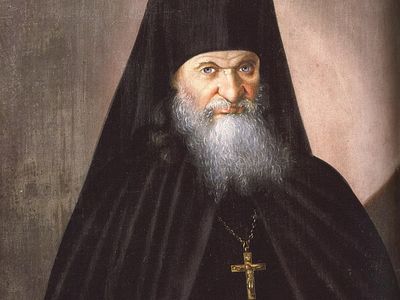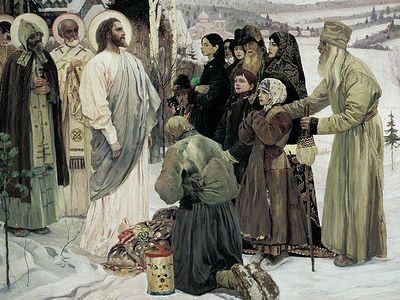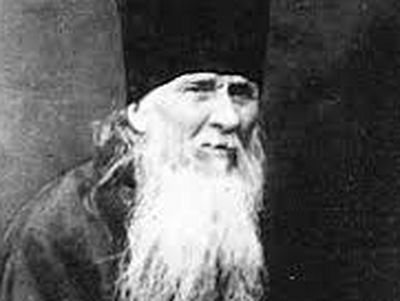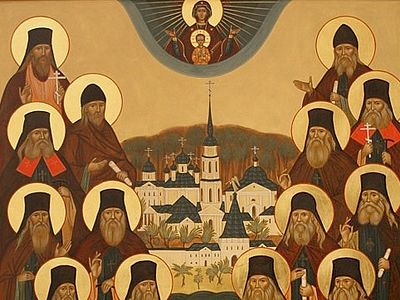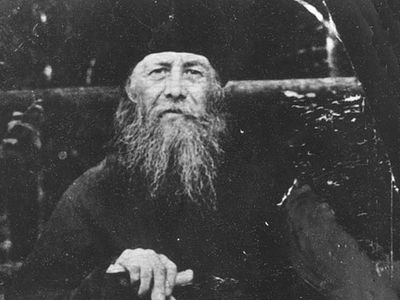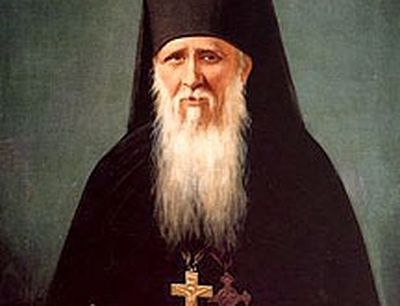St. Hilarion (in the world, Rodion Nikitich Ponomarev) was born in the town of Kluchi in the Voronezh gubernia1 into the family of the tailor Nikita Philemonovich Ponomarev and his wife Euphemia Nikiforovna, the third of four sons.
Quiet and not prone to talkativeness, the boy grew, even as a child feeling a yearning for the monastic life. His first close acquaintance with monasticism was when he was 13, and then 17 years old, during pilgrimages with his mother to the shrines of the Kiev-Caves Lavra.
The youth diligently learned the tailor’s trade in his father’s home, having decided that this profession would stand him in good stead in a monastery. When Rodion turned 24, his family moved its residence to Saratov. The young man managed a whole cooperative of tailors there.
Brought up in the fear of God from his youth, strictly observing the regulations of the Orthodox Church, he made the rule that on Sundays and feast days the whole cooperative attend Vigil and Liturgy without fail. Not only that, but, with the help of a deacon that he knew, he taught his workers Church singing, and at their work they sang spiritual songs instead of secular songs. At that time many sectarians and schismatics lived in Saratov, and Rodion Ponomarev became one of the most zealous and active missionaries.
Later, at Optina Hermitage, the elder would recall:
“Although we tried to live a God-pleasing life, and it seemed as if we were occupied with pious things, I felt that we still were still not living as we should—that monks lived better than we did.
The monastic life had already attracted Rodion Nikitich since his early youth, but now, at 33 years of age, he started to think seriously about fulfilling his desire. In the course of nine months he made pilgrimages to the monasteries of Sarov, Suzdal, Great Rostov, Belozersk, and Tikhvin. He also went to Solovki, Pochaev, Valaam, and the Glinsk and Ploschansk Hermitages. When he came to Optina, he became acquainted with the elders Leo and Macarius. He conversed with them, and after this he made a firm decision to remain at Optina forever.
After he had returned to Saratov to set his worldly affairs in order, Rodion Nikitich soon set off for Optina Hermitage. Out of the 63 years of his life, he spent 34 in the monastery—half of the course of the life measured out to him by God. He was St. Macarius’s cell-attendant for 20 years, with all his soul soaking up the example of the elder’s God-pleasing life, which was full of love, humility, meekness, and simplicity.
The cell-attendant’s devotion to his starets was very great. Once when St. Macarius was away from the monastery, his carriage turned over into the ditch, and the elder himself had dislocated bones and serious contusions. At that time, Fr. Hilarion was sick, but when he heard the sad news, he rushed right away to his spiritual father, not worrying about his own health, travelling about 300 versts on relays of horse and carriage on the bad autumn roads.2 And the elder loved and esteemed his cell-attendant.
Fr. Hilarion worked a great deal—he didn’t spend more than four hours a day sleeping. After he had dealt with his duties as a cell-attendant, during the brethren’s common hours of rest, and at dawn, he loved to work in the garden—he took care of the apple trees and planted flowers. By his efforts, the Skete was transformed into a blossoming garden. With the Elder’s blessing he set up a first-aid kit and often fulfilled the duties of a paramedic among the brethren. In the late fall and in the winter, when the garden lay dormant, he would make very beautiful wooden spoons.3
 St. Hilarion of Optina
St. Hilarion of Optina
St. Hilarion was a skilled spiritual physician. He taught people who were suffering to go over their whole previous life from the age of seven, to recall forgotten unrepented sins, in which were often hidden the reason for a spiritual illness. If, however, the visitor for some reason was unable to recall anything, then the starets himself, by means of carefully-chosen questions, sized up the matter and drew out the unrepented sin to the person’s recollection.
Schema-archimandrite Fr. John (Maslov) of Glinsk remarked that St. Hilarion “possessed the gift of prayer to so act on a person, that he, feeling the invisible presence of the Almighty Lord, would confess to the elder with all openness the most hidden movements of his heart.”
The elder’s love for suffering people was boundless. Somehow a mentally ill woman came to him for confession, from whose mouth streamed vulgar, obscene abuse. Not paying any attention to it, St. Hilarion got her to come to full consciousness and repent of the sin for which she suffered so greatly. “You had better leave her alone, Batiushka, if she is like that,” remarked someone. But St. Hilarion answered, “You know, she has a soul just as you and I. The whole world is not worth one soul!”
A 40-year-old peasant woman from the Odoyevsky ouyezd related that during the course of many years she suffered severely from attacks accompanied by muscle spasms, shrieks in different voices, and abusive language. The sick woman displayed such strength that several men were not able to restrain her. In this case, as always, the elder heard the confession of all her sins—especially the unrepented ones, and lo and behold, by the grace-filled power of the Sacrament of Confession she received complete healing through the Elder.
A merchant from the Tula guberniya suffered from mental illness for more than a year: It seemed to him that everybody was making fun of him and what he did, and that some people unknown to him were following him wherever he went and wanted to kill him. These thoughts gave him no rest day or night—he had already thought of suicide several times, and his family was terrified.
The Elder conversed at length with him several times, and found that there was a sin that he had concealed at confession, doubting that it could be forgiven. The starets assured him that there was no sin that God’s love for mankind could not forgive, if one repented of it; so the merchant brought it to confession and repented of it. After he had received absolution, he was counted worthy of Communion of the Holy Mysteries. When they parted, the Elder said to him, “Well, go with God4—now they will not follow you or bind you.” And so it really happened: the merchant completely recovered from his tormenting affliction.
Another young merchant was also possessed for two years with a delusion of being followed, which drove him out of his mind. He avoided people; he wandered about with a lost look, repeating meaningless words. Elder Hilarion devoted a lot of time to him, and from questioning him he realized that the main cause of his sickness was his enmity towards his father and the insubordination to him that he hid in his heart. The elder long tried to convince him to abandon his spite and ask his father’s forgiveness, arguing that only after this could he hope for God’s help and be freed of his illness. The merchant finally agreed and repented. His soul was cleansed by repentance and was filled with peace.
A spiritual daughter recollects: “Once when I was at Optina Hermitage, I saw a woman who with reverence told me the following: she had been childless for 17 years. She and her husband lived well enough, but they were very upset that they didn’t have any children. She came with her grief to Fr. Hilarion. He blessed her to make a trip to Zadonsk, and, it seems, to Voronezh, and added, “And next year you will come here with your child.” And exactly a year later in May she came to Batiushka with a son, who was three years old when I first saw him.”
One of the Elder’s spiritual sons testified: “More than once I noticed that Batiushka, wanting to say something for my benefit, in his humility did not state it outright, but rather in the form of a guess or advice, so that at first I didn’t pay any attention to it.
“But when I noticed that all of his advice came true—some of it even after several years—then I began to pay attention to every word as he spoke. I tried as much as I could to keep his words in my poor memory, in full confidence that sooner or later it would come true, or that I would have to be guided by these words to deal with some temptation or circumstances that awaited me.”
The Elder taught his spiritual children not to judge, and to have humility and self-reproach. Once it happened that two monks who had had a quarrel asked the Elder to let them personally explain themselves in his presence, in order to stop the quarrel. When he had heard each one’s arguments, Fr. Hilarion said, “From your words, it seems that each of you is right…” Each one insisted, as before, that he was right. Then the Elder, seeing their unwillingness to become reconciled, said to them, “Well, I didn’t expect such fruits from you! I alone am at fault for not having taught you self-reproach.” To the amazement of the quarrelers, the starets humbly did a prostration before them with the words, “Forgive me, for the sake of God!” The monks, deeply touched by such a prostration by their guide, acknowledged their self-love and guilt and asked the Elder to forgive them, promising to begin to correct themselves.
Fr. Jerome, the Elder’s cell-attendant, recalled, “Batiushka strove to inspire love among the brethren and oneness of mind, and to heal those who came to him—laypeople and monastics alike—of their passions, and no one went away from him without receiving benefit. It often happened that, not sparing himself, he gave even the few hours he had for rest for the benefit of his neighbors. Because of this he imperceptibly lost his strength and approached the end of his life.”
Then came the spring of 1873. On March 4 St. Hilarion served his last Liturgy. Returning to his cell, he said, “I have never been this tired—it must be that my end has come.” On March 9 he was tonsured into the Schema, keeping the name Hilarion. In spite of his frail weakness, insomnia, chronic shortness of breath, which changed at night to asphyxia, and his severe pain, the elder did not once—up to the last morning of his life—abandon the Skete rule of prayer.
At dawn on September 18, 1873, Starets Hilarion quietly and peacefully departed to the Lord. The weather, which up to that point had been overcast and rainy, cleared up on the day of his death.
In 1996 St. Hilarion was added to the choir of the local saints of Optina Hermitage, and in August of 2000 at the Jubilee Hierarchical Council of the Russian Orthodox Church he was glorified for veneration by the whole Church. St. Hilarion’s relics rest in the Vladimir Church at Optina Hermitage.
Holy Father Hilarion, pray unto God for us!


